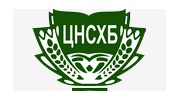Trotsuk I.V. Evaluation or action? The only choice for agrarian studies // The Russian Peasant Studies. 2017. V.2. №3. P. 200-207.
DOI: 10.22394/2500-1809-2017-2-3-200-207
About the author
Trotsuk Irina V., DSc (Sociology), Associate Professor, Sociology Chair, RUDN University; Senior Researcher, Center for Agrarian Studies, Russian Presidential Academy of National Economy and Public Administration. 119571, Moscow, prosp. Vernadskogo, 82.
E-mail: This email address is being protected from spambots. You need JavaScript enabled to view it.
A guide to the post-soviet agrarian reform in Russia: Objective and subjective dimensions of rural life
Oct 05 2017Trotsuk I.V. A guide to the post-soviet agrarian reform in Russia: Objective and subjective dimensions of rural life // The Russian Peasant Studies. 2017. V.2. №3. P. 162-190.
DOI: 10.22394/2500-1809-2017-2-3-162-190
About the author
Trotsuk Irina V., DSc (Sociology), Associate Professor, Sociology Chair, RUDN University; Senior Researcher, Center for Agrarian Studies, Russian Presidential Academy of National Economy and Public Administration. 119571, Moscow, prosp. Vernadskogo, 82.
E-mail: This email address is being protected from spambots. You need JavaScript enabled to view it.
Russia, Poland, and China: Models of post-socialist rural development. Round table // The Russian Peasant Studies. 2017. V.2. №3. P. 120-151.
DOI: 10.22394/2500-1809-2017-2-3-120-151
Annotation
This article is a transcript of the round table at the Rosa Luxemburg Foundation on March 27, which focused on the comparative analysis of the strategic directions of post-socialist rural development in the People’s Republic of China, the Polish People’s Republic and the Russian Federation. Professor Roman Kisiel made a presentation on the problems of Polish rural economy; professor Yan Hairong highlighted the dialectics of contradictions between collective and private farming in China. To a certain extent the Russian scientists L.D. Boni, V.V. Babashkin, and A.V. Gordon became the co-presenters of the Polish and Chinese colleagues when discussing such problems of rural development as the interaction of large and small-scale agrarian production, capitalist, family and collective forms of agriculture, economy and ecology, the city and village, and especially the national agrarian policies regulating all the above. In many ways, China and Poland turned out to be the poles of political and social-cultural agrarian transformations, which determine possible variations of regional models of rural-urban development in Russia. The round table discussion can be useful not only for academic scientists, but also for practitioners involved in developing state and municipal agrarian policies that are to take into account international agrarian experience.
Keywords
peasantry, land ownership, agrarian reforms, rural development, comparative studies, China, Poland, Russia
About the authors
Babashkin Vladimir V., Professor, Russian Presidential Academy of National Economy and Public Administration. 119571, Moscow, prospect Vernadskogo, 82.
E-mail: This email address is being protected from spambots. You need JavaScript enabled to view it.
Boni Ludmila D., DSc (Economics), Chief Researcher, Institute of Far Eastern Studies, Russian Academy of Sciences, Moscow, 117997, Nakhimovsky Av., 32.
Gordon Alexander V., DSc (History), Head of the East and South-East Asia Branch, INION of the Russian Academy of Sciences
E-mail: This email address is being protected from spambots. You need JavaScript enabled to view it.
Kisiel Roman, Professor of Economic Science, University of Warmia and Mazury in Olsztyn, Poland. 10-719 Olsztyn, ul. Oczapowskiego 4.
E-mail: This email address is being protected from spambots. You need JavaScript enabled to view it.
Nikulin Alexander M., PhD (Economics), Head of the Center for Agrarian Studies, Russian Presidential Academy of National Economy and Public Administration; 82, Prosp. Vernadskogo, Moscow, 119571, Russia
E-mail: This email address is being protected from spambots. You need JavaScript enabled to view it.
Pugacheva Marina G., Senior Researcher, Centre for Fundamental Sociology Higher School of Economics, Deputy Editor Russian Sociological Review, Staraya Basmannaya str., 21/4, Room A205, Moscow, Russian Federation 105066.
Trotsuk Irina V., DSc (Sociology), Associate Professor, Sociology Chair, RUDN University; Senior Researcher, Center for Agrarian Studies, Russian Presidential Academy of National Economy and Public Administration. 119571, Moscow, prosp. Vernadskogo, 82.
E-mail: This email address is being protected from spambots. You need JavaScript enabled to view it.
Hairong Yan, Professor, Hong Kong, Polytechnic University, Hung Hom, Kowloon,
E-mail: This email address is being protected from spambots. You need JavaScript enabled to view it.
Trotsuk I.V. “…The search for a better world must be based on a thorough knowledge of geography” // The Russian Peasant Studies. 2017. V.2. №1. pp. 148-165.
DOI: 10.22394/2500-1809-2017-2-1-148-165
Annotation
Review of book: Замятин Д. Н. Постгеография. Капитал(изм) географических образов. СПб.: Гуманитарная академия, 2014. — 592 с. ISBN 978-5-93762-108-5.
Каплан Р. Месть географии. Что могут рассказать географические карты о грядущих конфликтах и битве против неизбежного / пер. с англ. М. Котова. М.: КоЛибри, Азбука-Аттикус, 2015. — 384 с. ISBN 978-5-389-10490-7.
About the author
Trotsuk Irina V., DSc (Sociology), Associate Professor, Sociology Chair, Peoples’ Friendship University of Russia; Senior Researcher, Center for Agrarian Studies, Russian Presidential Academy of National Economy and Public Administration. 101000, Moscow, prosp. Vernadskogo, 82.
E-mail: This email address is being protected from spambots. You need JavaScript enabled to view it.
Sobolev A.V., Kurakin A.A., Trotsuk I.V. Methodological approaches to the study of Russian cooperation and “Theory and practice of cooperation” as an academic discipline // The Russian Peasant Studies. 2017. V.2. №1. pp. 31-50.
DOI: 10.22394/2500-1809-2017-2-1-31-50
Annotation
The article focuses on the theoretical and methodological problems encountered by the Russian scholars of cooperative organizations. The authors identify four basic methodological approaches to the cooperation phenomenon in the Russian academic tradition: (1) socio-reformist (or socio-ideological), (2) descriptive-monographic, and (3) economic-theoretical, with the first two being dominant. After a short discussion of the prospects and limitations of the theoretical studies of cooperatives as business organizations by Russian scholars, some of the distinguishing features of Russian cooperation thought are mentioned. Considering the features of the Russian cooperative thought, the authors found it useful to name the most prominent Russian researchers of cooperation who can be included in the ICA list of the world cooperative heritage. The authors pay special attention to the myth of the first Russian cooperative and the Decembrists as the first Russian cooperators. Unfortunately, this myth was officially recognized and determines the birthday of the cooperative movement in Russia. The article briefly discusses the contribution to cooperative thought made by Antsiferov, Bilimovich, Tugan-Baranovsky, Chayanov, and Totomianz. Special attention is paid to the scientific contribution of Emelianoff, almost unknown in modern Russia, and the fate of his ideas. Finally, the authors emphasize the particular importance of describing the transformations and the most important achievements of the Russian and foreign cooperative thought in the curriculum of the discipline “Theory and practice of cooperation”.
Keywords
Russian cooperative thought, the history of Russian cooperation, the birth of Russian cooperative movement, economic theory of cooperation, Emelianoff, cooperation as an academic discipline.
About the authors
Sobolev Alexander V., DSc (Economics), Senior Researcher, Center for Agrarian Studies, Russian Presidential Academy of National Economy and Public Administration (RANEPA). 119571, Moscow, prosp. Vernadskogo, 82; professor The Russian University of Cooperation (RUC).
E-mail: This email address is being protected from spambots. You need JavaScript enabled to view it.
Trotsuk Irina V., DSc (Sociology), Associate Professor, Sociology Chair, Peoples’ Friendship University of Russia; Senior Researcher, Center for Agrarian Studies, Russian Presidential Academy of National Economy and Public Administration. 119571, Moscow, prosp. Vernadskogo,82.
E-mail: This email address is being protected from spambots. You need JavaScript enabled to view it.
Kurakin Alexander A., Senior Researcher, Center for Agrarian Studies, Russian Presidential Higher School of Economics. 101000, Moscow, Myasnitskaya, 20.
E-mail: This email address is being protected from spambots. You need JavaScript enabled to view it.
Bernstein G., Trotsuk I. Policital Economy of the Agrarian Change // Russian Peasant Studies. 2016. V.1. №1. P. 8-37.
DOI: 10.22394/2500-1809-2016-1-1-8-37
Annotation
According to the author, the understanding of the agrarian transformations in the modern world requires an analysis of capitalism as a special system of social relations between capital and labor, which as historical development is changing the social nature of small farms, runs the processes of commodification and produces not a single "class" of the peasants or the heads of households and internally heterogeneous classes small agricultural capitalists, small producers and workers. The author poses a challenge - using categorical apparatus of the class theory of Marx on the capitalist mode of production, to bring order in the diverse and complex agrarian history of the modern world, designating a number of "common themes" in the world-historical career of capitalism and refusing thereby from simple and ideologically attractive moralizing stories about peasant world and its disappearance. The article indicated by the general logic of the historical relationships of colonialism and capitalism, gave rise to large-scale agricultural transformation on all continents; highlighted local and global trends in the development of agriculture and the rural economy; given the characteristics of new forms of organization of the world capitalist system that emerged under the influence of neo-liberal globalization; The role of resistance to capitalist exploitation and land reform in the development of modern agriculture.
Keywords
political economy, agrarian change, capitalism, colonialism, class of capitalists, class of petty commodity producers, class of wage labour, Marx’s theory
About the authors
Bernstein Henry, Professor of Development Studies of the University of London at the School of Oriental and African Studies, Adjunct Professor at the College of Humanities and Development Studies of China Agricultural University, Beijing; coeditor of Journal of Agrarian Change.
Thornhaugh Street, Russell Square, London WC1H 0XG, United Kingdom.
E-mail: This email address is being protected from spambots. You need JavaScript enabled to view it.
Trotsuk Irina, D. Sc (Sociology), Associate Professor at the Sociology Chair of Peoples’ Friendship University of Russia; Senior Researcher at the Center for Agrarian Studies of the Russian Presidential Academy of National Economy and Public Administration.
E-mail: This email address is being protected from spambots. You need JavaScript enabled to view it.























